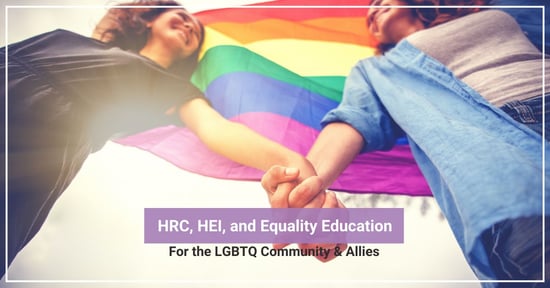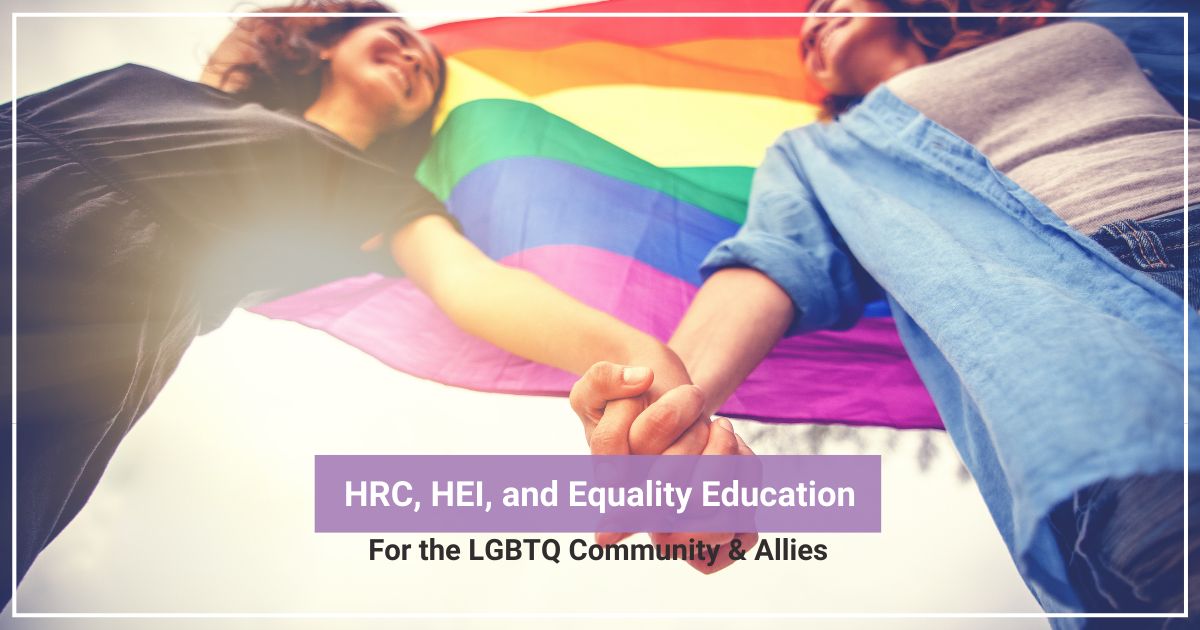HRC, HEI, and Equality Education for the LGBTQ Community
October 7th, 2020 | 6 min. read

 The Human Rights Campaign is the largest and most powerful LGBTQIA+ organization in the U.S. Their membership of fifty two million spans all states, in fact, all zip codes. Their dedication, since 1980, has been consistent and forward-thinking, and they provide reliable resources for LGBTQ individuals, communities, and families alike.
The Human Rights Campaign is the largest and most powerful LGBTQIA+ organization in the U.S. Their membership of fifty two million spans all states, in fact, all zip codes. Their dedication, since 1980, has been consistent and forward-thinking, and they provide reliable resources for LGBTQ individuals, communities, and families alike.
What is the mission of the Human Rights Campaign?
In looking into what drives the Human Rights Campaign (HRC), the best place to start is their mission statement - “The Human Rights Campaign envisions a world where every member of the LGBTQ family has the freedom to live their truth without fear, and with equality under the law. We empower our 3 million members and supporters to mobilize against attacks on the most marginalized people in our community.”
If you're wondering, "what does the Human Rights Campaign do?" the better question is, what doesn't it do? Some of the key objectives of the HRC include mobilizing voters for equality, advancing legislation and policy concerning equity in all forms, and educating the public and the community about LGBTQ issues.
What is the HEI, and why is it important for members of the LGBTQ community?
Each year, the Human Rights Campaign Foundation publishes a series of indexes evaluating organizations on their level of LGBTQ inclusivity. For members and allies of the community, these can be valuable tools to use when choosing an employer, a healthcare facility, or when relocating to a new area of the country. One of these tools is the Healthcare Equality Index, a survey that examines 4 criteria related to patient and staff treatment among healthcare facilities. The results of those surveyed criteria (patient non-discrimination, equal visitation, employment non-discrimination and staff training in LGBTQ patient centered care) are then assembled into the HEI Resource Guide - a free, online resource.
This guide serves the LGBTQIA+ community, confidently guiding users to find health caregivers that suit their needs, and allowing healthcare allies to examine their own practices to discover whether they meet the criteria needed to be a HEI leader in inclusivity.
Becoming an HEI leader is not a simple or easy accomplishment. The criteria is rigorous, demanding that every employee of a provider’s practice be involved in the training. It’s little wonder that when you are ready to build a family, this is the resource on which you would depend to find clinically excellent, compassionate and LGBTQIA+ inclusive health care providers.
Why do I need to know about the HEI as a member of the LGBTQ community and/or an ally?
Having a health care provider who cares enough about you to educate themselves is paramount to quality medical care- they understand that pronouns aren’t just words, they ask questions in a sensitive way, and they have materials that appropriately represent you.
Is Your Physician an Ally?
Not every doctor is a perfect fit for every patient or person who needs help. By undergoing the rigorous process necessary to become an HEI leader, a statement is being made - that you welcome with open arms a community that doesn’t always get equal, professional, or compassionate responses, and that you are dedicated to providing the best possible experience, professionally and compassionately, for any LGBTQIA+ person who comes into your office.
How important is this?
Very. In a 2014 Lambda Legal survey (When Health Care Isn’t Caring) of LGBTQ individuals, 56% of LGB (lesbian, gay & bisexual) respondents surveyed reported that they had experienced at least one of the following types of discrimination in healthcare:
- Being refused needed care
- Healthcare professionals refusing to touch them
- Healthcare professionals using abusive or harsh language Being blamed for their health status because of their LGBTQ status
- Healthcare professionals being physically rough or abusive
That percentage was even higher (70%) for trans and gender non-conforming respondents. Many members of the LGBTQ community reported being denied care outright.
Although our society has taken steps towards equity for the LGBTQ community in the past six years, many individuals still report similar experiences when they approach a doctor’s office about biological family building and fertility. When it comes to family building, there are few things that the LGBTQIA+ community takes more seriously or is more serious about.
According to a recent LGBTQ Family Building Survey, “63% of LGBTQ Millennials (aged 18-35) are considering expanding their families, either becoming parents for the first time, or by having more children”. Those individuals are aware of their rights, and know how to use the tools at their disposal to pick the practice that best fits their needs. For the LGBTQIA+ community, the HRC helps to identify those practices with the Healthcare Equality Index.
For LGBTQ moms Stef & Denise, feeling welcomed right away at their fertility practice made all the difference.Watch their story below.
Gay Parents To Be is an Ally
Gay Parents To Be is committed to the inclusivity that the Human Rights Campaign demands. For the fourth year in a row, Gay Parents To Be’s partner clinic, RMA of Connecticut, has achieved Leadership status, one of only 2 freestanding fertility clinics in the US to achieve this status. This responsibility is not undertaken lightly and all employees of Reproductive Medicine Associates of Connecticut understand that Gay Parents To Be is an integral and essential part of the practice.
Helping the LGBTQIA+ community build their families is both an honor and a joy. Some people come to Gay Parents To Be knowing all the steps that will be necessary to become a parent, but many don’t. Having Dr. Mark Leondires as our medical director and founder, goes a long way towards making those unsure patients feel comfortable. He’s not only a member of the LGBTQ community, but also a dad through surrogacy -- he understands the process, both professionally and personally. His dedication to the LGBTQIA+ community is echoed throughout Reproductive Medicine Associates of Connecticut. Per the HEI, all forms, processes, questions, language and even our bathroom signs, are based on inclusivity for the LGBTQ+ individual.
If you’re a prospective parent, wondering where to start, know that you deserve the best, most accessible, most compassionate, clinically excellent health care available. Start a conversation with others in your community, and crowdsource local practice recommendations.
Thankfully, the HEI and HRC have done some of that work for you, giving you the tools you need to find the right healthcare providers for your journey.
Interested in learning how to find the best, most inclusive fertility practice for you? Click to read more.
Working with Gay Parents To Be and our partner fertility clinic, Illume Fertility, as a dedicated Patient Advocate gives Lisa Rosenthal an opportunity to expand her passion and commitment to reproductive health and family building. Lisa is committed to supporting all families in having the families that they desire, in the ways that work best for them.
